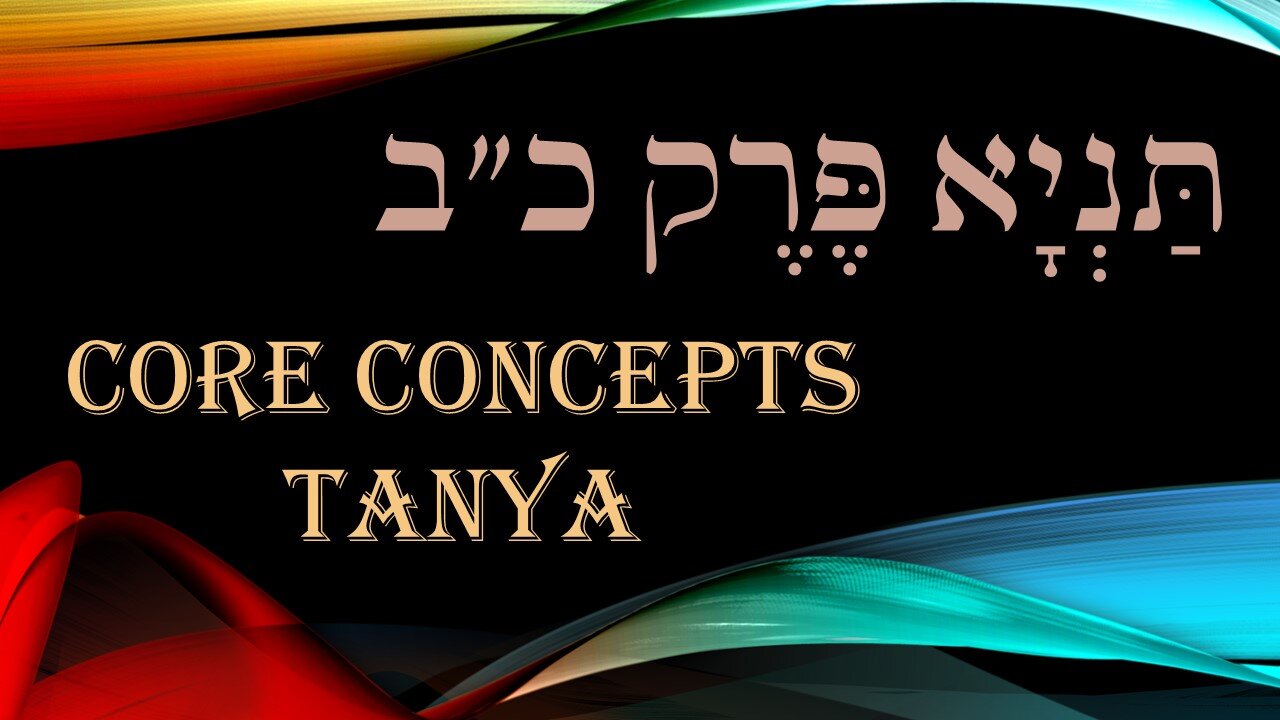Premium Only Content

Core Concepts Tanya: Chapter 22
Brief Recap of Chapter 22:
1. Hashem had to hide Himself within creation to create a world of free choice. He mainly did so through a series of "tzimtzumim," contractions, which compact His light and life force so we can exist as "separate” entities. However, just as a turtle cannot hide from itself in its own shell, these contractions don't affect Hashem's view of the world. All is light and good from His perspective.
2. Because these contractions are so powerful and effective, they allow the existence of forces that deny Hashem's will, "klipah" and "sitra achara." Hashem doesn't actually want these forces to exist, but they are necessary for reward and punishment. This connects to the idea of "internal" vs "external" will. Internal will is whatever is desired. External will is whatever gets us what's desired, as in a means to an end. Hashem wants to abundantly reward us, but we need to earn it through overcoming challenges and choosing to serve Him. Ergo, obstacles in the world are part of Hashem's external will and are merely a means to an end, our reward. As such, thier life force comes from the most external part of Hashem, "derech achorayim", behind-the-back. Hashem doesn't want to give them life so they are called an "abomination which Hashem hates." Conversely, we receive life from the most internal part of Hashem.
3. "Sitra achara" the "other side" exists so we may have freedom of choice.
4. There are two types of life forces: "internalized" and "encompassing." The "internalized" life force is tailor-made to each creation, discerning and specific to individual characters, capacities, and identities. "Encompassing" is a higher life force and much less discerning as it simply surrounds everything. The “other side” acknowledges Encompassing force but not Internalized. Why? Accepting this life force would be a contradiction of their MO. They don't deny Hashem exists in the world, they simply deny His providence and direct involvement in every facet of life, which ultimately leads to submission to His will. As such, the spark of Hashem that gives them life is considered to be in exile within them.
5. Arrogance is compared to idolatry, because idolatry isn't just about bowing to an idol, to anything that denies Hashem's unity in this world. Arrogance is an aggrandizement of self instead of surrender of self, and the more "self" an entity is, the less room that entity has for others, specifically Hashem and His will. (Remember: the "hidden love" of every Jew dwells in a place above intellect, a place of complete humility and submission, because that is a place untouched by outside forces.)
6. This goes back to why we are taught that all the Torah is included in the first two commandments. The first commandment of "I am Hashem" is our acceptance and submission to Him. This includes all positive mitzvot because it's our way of connecting to Him and affirming our belief in His unity in this world. The second commandment of "You shall not have any other gods before me" includes all prohibitive commandments, as these are all the things that Hashem tells us deny His absolute unity and thereby create a rift or separation in our relationship with Him.
These past few chapters provide an insightful and powerful look into the makeup of this word, at once giving a deeper awareness of existence, while also setting the stage for the relevance of our own relationships with Hashem. Most important is to remember that belief, love, and fear/awe of Hashem isn't an abstract idea but a very real affirmation of His absolute unity within this world, an acceptance that He is all and that all comes from Him, that He isn't just the source of all existence but also intimately involved in every aspect of our lives. The more consistently we assert that, the better we can serve Him.
-
 1:05:46
1:05:46
The Quartering
2 hours agoNew Epstein Video Drops! The US Economy Has SCARY Numbers Released & More
88.2K19 -
 LIVE
LIVE
The White House
5 hours agoPresident Trump Makes an Announcement, Dec. 3, 2025
1,730 watching -
 16:30
16:30
Clintonjaws
5 hours ago $0.04 earnedEntire Room Speechless as Pete Hegseth Snaps Destroying All Media To Their Face
701 -
 LIVE
LIVE
Film Threat
21 hours agoINSIDE THE DECLINE OF DISNEY! A WARNING FROM THE PAST | Hollywood on the Rocks
94 watching -
 1:15:43
1:15:43
DeVory Darkins
3 hours agoDISTURBING: Gavin Newsom makes FATAL MISTAKE after Criminal Illegal Alien kills 11 year old boy
105K52 -
 LIVE
LIVE
MattMorseTV
3 hours ago $9.28 earned🔴Trump's HUGE ANNOUNCEMENT.🔴
2,080 watching -
 LIVE
LIVE
Dr Disrespect
5 hours ago🔴LIVE - DR DISRESPECT'S TRIPLE THREAT CHALLENGE - ARC RAIDERS • BF6 • FORTNITE
1,256 watching -
 1:18:21
1:18:21
Sean Unpaved
4 hours agoArch Manning & Texas ELIMINATED From College Football Playoff Contention | UNPAVED
30.4K3 -
 1:59:06
1:59:06
The Charlie Kirk Show
4 hours agoBlackpilled Zoomers + Charlie's Sabbath + Minnesota Meltdown | Bowyer, Turek, Glahn | 12.3.2025
60.7K29 -
 12:44
12:44
Dr. Nick Zyrowski
2 days agoThe REAL Benefits of One Meal A Day (OMAD) Intermittent Fasting
22.9K3